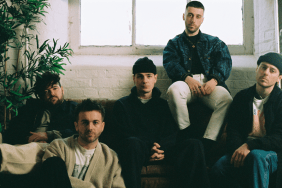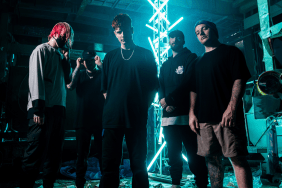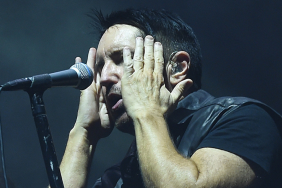65daysofstatic are UK electronic rock “legends” whose influence and significance amongst underground experimental rock artists is spoken of highly and consistently.
They exploded onto the world scene with their innovative debut The Fall of Math in 2004, following up with the electronic-post-rock amalgamation seen on One Time for All Time in 2005. The success of the albums saw them come to the attention of The Cure’s Robert Smith, leading them on an unlikely world tour with The Cure that saw them play huge arenas across the UK, Europe and US.
Yet the band’s profile in Australia has been limited, due to an absence of local promotion, with hardcore fans following the band’s progress from afar. Until this year, it seemed unlikely that they would ever visit our shores.
But a chance meeting in Belgium lead to a local release schedule, including the band’s entire back catalogue, along with a carefully selected heap of additional material – and then, the long-awaited tour announcement for January 2013.
Keen to make up for lost time, they’ve done a plethora of press interviews since the tour was announced. But here I’m hoping to cover some ground that hasn’t been explored as much.
On the eve of their first Australian tour, I emailed Paul Wolinski (guitar/electronics/keys) some choice questions to check out.
Prog Blog: Firstly, can’t wait to see you guys again, and in Australia for the first time. I heard Simon (bass) and your tour manager, Tommy, have visited before, but this is the first visit for the rest of you?
Paul Wolinski: Yep. You heard correct. You have good sources. Keep them safe.
PB: Do Simon or Tommy have any sightseeing tips? Anything in particular you’re hoping to check out – touch a koala etc.?
PW: There’s excited talk of some small island off the coast of, I think, Perth, but mostly the specifics of our adventure appear to be getting kept under wraps. Loose lips sink ships.
PB: In several interviews you’ve stated that 2010’s We Were Exploding Aanyway/Heavy Sky was “the record you’d been trying to make” since the band formed – but it doesn’t quite seem that way. The early stuff always neatly blended noisy electronics with rock, but aside from some of the remixes from The Destruction of Small Ideas era, there doesn’t seem to be much hi-fi dance-ability going on. Could you perhaps explain a bit further about what you mean by that statement?
PW: If you seek out our first ever EP called ‘stumble.stop.repeat’, it might make more sense. We began as a crazy-loud hybrid of noisy guitars and big, glitchy electronic programming. We’ve explored a few different avenues since then, but it feels like WWEA was us working out how to properly harness that original idea.
That’s just what it sounds like to my ears, though. I might be wrong. It certainly wasn’t any kind of masterplan.
PB: The production values on WWEA/HS are a marked change from those previously; was this achieved through a different recording budget, or approach?
PW: Just learning as we go, really. The album prior to WWEA/HS in particular was a big learning experience. WWEA didn’t have a significantly different setup with regards to budget or approach. I think it was more to do with the fact that we worked out how to write songs with less things going on in them, so there’s more space for a bit of clarity.
PB: You guys have a long association with Monotreme Records, releasing your first 3 albums through them before switching to work with Hassle on WWEA. What were the reasons for the change? Did it play out as expected? Where do you see the band heading in future?
PW: Hassle Records. Never has a record label been more aptly named. Monotreme Records, on the other hand, are probably the best record label in the world. In it for exactly the right reasons. The switch for WWEA was for various reasons, but we’ll always be a Monotreme band. Regards the future, who knows. It’s an industry in free fall, isn’t it? Anything could happen.
PB: Several interviews have asked about the crowd-funding experience of Silent Running. I want to ask about the writing process – you’ve mentioned that you rarely come up with defined imagery when you write, preferring instead to communicate feelings through music. Yet for Silent Running surely the imagery had to play a large role in your writing – did you write differently?
PW: It was a very different approach. We had the film being projected onto the wall all the time in our rehearsal room when we were putting together ideas, and because we decided early on that we wanted to write precisely to an edit, there were some really strict parameters we had to write inside of. Lots of timelines, stopwatches, songs slowed up/down to unlikely bpms to fit into the space they were designed for… In a lot of ways, I think it was even more restrictive than writing a soundtrack for a new film, because presumably the film is in more of a liquid state when you’re writing.
PB: You guys have mentioned the difficulties of balancing work and touring, highlighting the numerous jobs you quit to go on tour in your early days. For the benefit of aspiring career musicians, what kind of lifestyle are you able to lead as a working band and how do you budget to survive?
PW: If you’re an aspiring musician, don’t hope for a happy ending. There probably won’t be one. I mean, at least if your idea of a happy ending is that you will become successful enough not to have to worry about how to pay your bills, or keep hold of friends, or start a family, or any of those kinds of things.
If 65 stopped today, then we’d be looking for jobs the week after.
We keep a constant check on ourselves to make sure that we are still going because we feel like we still have something to say, rather than because we need to pay our rent.
PB: You’ve mentioned how to try to approach 65 as a ‘nine-to-five’ job. When you’re not in the studio or on tour, what does a typical week look like for 65? What does it mean to be in a ‘working band’ 5 (or 7?) days a week?
PW: Used to be we’d force ourselves to spend eight hours a day, five days a week in our rehearsal room, but not only did we drive ourselves crazy, the music we wrote, in hindsight, the material that came out, wasn’t the music we had wanted to make. It felt too forced. These days things are a bit looser, so much so that trying to describe a routine is a bit difficult. There are rarely days off, although 90% of the time it’s hard to feel like anything tangible has been achieved. Mostly, it feels like we just do our best to live in a state of readiness, pushing things forward in tiny increments, waiting for that one day every month or so when we hit some invisible tipping point and all this good stuff comes gushing out at once.
PB: What kind of future do you see for 65 and yourselves personally? What is left to achieve as a band? Where will you be in 10 or 20 years’ time? Are there families, home ownership or fancy cars on the bucket list, or are these sacrificed at the altar of world touring and the buzz of performing?
PW: We don’t really have those conversations and in any case, they probably aren’t very interesting to strangers reading an article about us. 65days is something that we’re very proud of and none of us want to stop, but a lot of the time it feels like we’ve made it into its own thing; it’s not directly tied to the four of us in a way it once was. That’s a good thing, I think, even if I’m probably articulating what I mean quite badly.
A long time ago we all came to the realisation that what’s best for 65 probably isn’t best for the four of us in terms of anything that could be described as a normal life. That’s exciting when you’re 20. It’s a bit more intimidating when you’re 30. We just take each record as it comes.
PB: Do you model your careers or work ethic on any other bands? i.e. people sometimes look at perennial touring acts like Deep Purple, but are there more relevant case studies for underground/experimental bands to look at?
PW: We did. We used to look at bands like At the Drive-in and admire their work ethic and willingness to tour. Now we are very interested in these acts who are blurring the lines between being recording artists and composers – Underworld/Orbital/Olafur Arnalds etc – because that’s something we’d very much like to move into.
PB: Is there life after music? Or does a future in production, teaching or sound tracking await?
PW: You know how part of string theory says that there might be other dimensions literally millimeters away from us, but because those millimeters are in the fourth or seventh dimension, or whatever, we can’t touch them or see them or know for sure that they exist? Well, that’s a bit like being in 65. We get hints that there’s a world outside of the one we’ve built around ourselves, but it’s impossible for us to properly comprehend it.
PB: You’ve described the music you make as the product of expressing your feelings and ‘getting them out’ so to speak. Musically, is 65 a comprehensive outlet for everyone? Are there side projects in the works, or unreleased demos that complement your emotional spectrum?
PW: Last year I (Paul) released a solo record under the name Polinski, which was fun, and done because there was a bit of 65 downtime, but undertaking that was as much about the next 65 record as anything else. I had a lot of dancy synth material that I liked, but didn’t want to try and force it into the 65 template, because it didn’t seem quite right. Releasing a standalone record seemed like a good way to clear it all out of my head, so when 65 started writing again I was fully focused, looking forward rather than pulling from this library of older ideas.
PB: You’ve also mentioned your preferences to shy away from tags like ‘post-rock’ in favour of a broader approach to appreciating music in general. But for the benefit of people who nevertheless love that ‘sound’, I am curious to know if there are any instrumental bands or quiet-loud-quiet bands that you are still interested in? And what are you listening to at the moment in general?
PW: I still listen to Godspeed You! Black Emperor regularly. They’re a cut above everything. Still stick on Young Team from time to time. Um… In general at the moment I’m listening to a lot of classical music. Rachmaninov and Mahler mostly. Looking for new exciting things…must be looking in the wrong places?
PB: Some people might compare elements of your sound to acts like Battles, Fuck Buttons or Holy Fuck. It seems like there’s a lot of swearing in making music like this, but aside from that, do you feel any affinity with those bands for the kinds of experimentation you all seem to be making?
PW: Yes. We have played with all of those bands and it is nice to see them have so much success. I can’t speak for them, but for 65, we have always liked to think of ourselves as a kind of ‘portal’ band: we’re a bit weird, but not too weird. It’s nice to think that kids who might listen to more traditional guitar or dance music stumble across us, and we end up opening a door which leads them to that wonderful world of incredible underground music that you have to really dig to discover.
PB: You’ve mentioned early influences like At the Drive-In, but where do you draw inspiration from now? Have there been other artists with a similar impact on you? Or is there now a ’65 sound’ that you just create different permutations of?
PW: This is a bit like that question from earlier where I mentioned At the Drive-in. It’s probably fair to say that there is now a ’65 sound’ I think it’s also fair to say that the majority of time we spend writing is spent trying to escape that sound, rather than embracing it.
PB: Touring with The Cure is probably a momentous experience for any band, but amongst the experimental music community your world tour with them from 2007-09 is probably the single biggest exposure of a sound like that to date. Do things like this hold any significance for you?
PW: I think it had a huge significance. It taught us a lot about how touring works on that level; boosted our confidence realising that our music works just as well in arenas as it does in tiny club venues; and watching The Cure night after night showed us how it was possible to write music that was at once both experimental and accessible and that there were still hundreds of thousands of open-minded people who appreciated bands who did this.
PB: One of the things I was curious about is the cancellation of the first run of tour dates with The Cure – they were later rescheduled, but surely there were significant costs for you to be able to do that, which might have been crippling for some bands. How did you deal with that?
PW: Like I said earlier, Monotreme Records are probably the greatest record label in the world. There are some insurance safeguards you can put in place for tours that large, but still, it was really tough. The Cure helped us out too in whatever ways they could, to ensure we could still make the rescheduled dates.
PB: What do you guys get up to in your spare time?
PW: Spare time?
PB: What is the music scene like in the UK? It seems like drum and bass has long been a popular genre, now with the rest of the world catching up to EDM and dubstep, do you see this as an opportunity for bands like 65?
PW: I have no idea. Honestly. There seems to be a lot of dubstep going round. There seems to be a lot of clutching at straws. We tend to ignore it all and just sit in our rehearsal room, writing songs and panicking.
PB: How has your gear selection changed and will be there any change in future?
PW: It’s getting more and more software-based. Touring has taken its toll on so much hardware, and laptops are getting powerful enough for us to build really complex live shows with a million different loops, instruments and v-drum kits all at our finger tips. That’s for the electronic side of things, at least. As far as the guitars go, the pedal boards keep getting bigger, heavier, and more expensive to take on airplanes.
PB: Your Radio Protector video (watch it here) puts in perspective the kind of environmental costs that a musician’s lifestyle can have. You guys have also commented on how there’s a conundrum involved when considering whether to print more ‘stuff’ when the world already has so much. Is this a sentiment shared by all the band and do such considerations affect the way you operate? Or is it just a matter of being aware but not alarmed?
PW: We are aware and alarmed and paralysed like most of the rest of the world. It feels impossible to fight for less in a society that has been entirely created on the impossible concept of endless growth. You can see why there are still so many climate deniers; it’s such a huge, terrifying truth to get your head round, it’s much easier and less scary to delude yourself.
Give it another fifty years and I don’t think any of us will have that choice any more. It will probably also be far too late to fix things by then.
In conclusion: no happy endings.
PB: The Peats Ridge Festival is lauded as one of the most sustainable festivals in Australia (and the world) with a minimal carbon footprint. Will you be checking out any of the sustainability workshops? Do you subscribe to any theories or models of sustainable living in particular?
PW: That sounds cool. Probably a bit hypocritical to fly half way across the world to check out a sustainability workshop, but maybe. Don’t know exactly what our schedule is yet, so don’t know how long we’ll be around.
PB: Some artists see music elevating them to a platform to communicate messages about politics, or the environment or some other cause. Being an instrumental act, do you aim to do this in other ways, or is it all about the music?
PW: Got to be careful not to come across as preachy. All you can do is explain what you believe to be important as articulately as you can and hope that people listen to it and decide for themselves what to think. There’s a lot of confused writing in a lot of our records about this. The older we get, the less we know, the more confused we become, the less writing there is. Music seems to be much better at describing the turn our thoughts have taken.
PB: How is the new album coming together? What sort of process have you taken for writing and recording this time? Is it any different to what you have done previously?
PW: It’s coming. As usual, it’s taken a long time. Probably the longest writing process so far. It’s not recorded yet. The approach has not been radically different, but the music has set itself apart as being significantly different to our ears.
We’ll share it before too long, hopefully.
PB: What kind of setlist can Australian fans expect on your visit here?
PW: Really good ones!
PB: In your travels around the world, do you get much time for sightseeing? Any memorable experiences?
PW: Not often, and some of the best experiences are associated with the shows rather than sightseeing because we get to meet wonderful people, and they take us to places that we would never have found on our own.
PB: Is there anything or anyone in particular in Australia that you’re keen to check out?
PW: Sharks. I’ll be keeping a close eye on them.
PB: Do you enjoy doing press interviews, or is it a matter of the shorter and less said, the better?
PW: It’s sometimes hard to imagine that people will be interested in reading so much of what I have to say! I used to think that these days it was getting close to impossible to retain an element of mystery about a band, but now that we are so many albums in, I realise that whatever it is at the core of 65 that allows us to do what we do is actually unknowable even by the four of us. So I’m happy to talk around it to try and make sense of it myself.
PB: Finally, because it’s relevant – what are your favourite karaoke songs?
PW: 4” 33’ by John Cage.
PB: Thaaaanks guys!
65daysofstatic will tour Australia for the first time in January, with special guests sleepmakeswaves
Wednesday, 2nd January
The Hi Fi, Sydney NSW http://www.moshtix.com.au
Thursday, 3rd January
The Hi Fi, Brisbane QLD http://www.moshtix.com.au
Friday, 4th January
Corner Hotel, Melbourne VIC http://www.cornerhotel.com
Saturday, 5th January
The Bakery, Perth WA http://www.tickets.lifeisnoise.com
65dos also play at Peats Ridge Festival on Sunday, Dec 30 http://www.peatsridgefestival.com.au
We Were Exploding Anyway/Heavy Sky, The Destruction of Small Ideas, One Time for All Time & The Fall of Math are out now through Bird’s Robe Records www.birdsrobe.bandcamp.com
Watch 65daysofstatic live:












